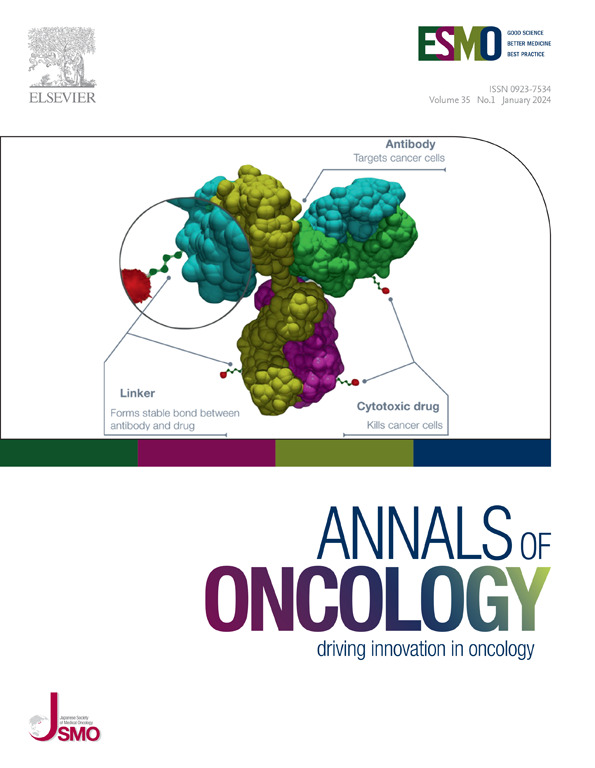吉西他滨、卡铂和 Epstein Barr 病毒特异性自体细胞毒性 T 淋巴细胞治疗复发性或转移性鼻咽癌:VANCE,一项国际随机三期试验。
IF 56.7
1区 医学
Q1 ONCOLOGY
引用次数: 0
摘要
背景:爱泼斯坦-巴氏病毒特异性细胞毒性T淋巴细胞(EBV-CTL)是一种自体收养性T细胞免疫疗法,由个人血液产生,未经基因改造。在之前一项针对局部复发或转移性鼻咽癌(R/M NPC)患者的 2 期试验中,吉西他滨和卡铂(GC)与 EBV-CTL 的一线联合疗法显示了 EBV-CTL 的客观抗肿瘤活性和良好的安全性。本研究探讨了与传统化疗相比,这种一线化疗-免疫治疗联合策略是否会产生更好的临床疗效和生活质量:这项多中心、随机、3 期试验评估了 GC 后 EBV-CTL 与单用 GC 作为 R/M NPC 患者一线治疗的疗效和安全性。新加坡、马来西亚、台湾、泰国和美国的 30 个临床研究机构参与了该试验。受试者按1:1的比例随机接受一线GC(4个周期)和EBV-CTL(6个周期)或GC(6个周期)治疗。主要结果是总生存期(OS),次要结果包括无进展生存期、客观反应率、临床获益率、生活质量和安全性:NCT02578641.Results:结果:共招募了 330 名鼻咽癌患者。两个治疗组的大多数受试者接受了≥4个周期的化疗,GC+EBV-CTL组的大多数受试者接受了≥2次EBV-CTL输注。中央药品生产质量管理规范(GMP)工厂为94%的GC+EBV-CTL受试者生产了足够的EBV-CTL。GC+EBV-CTL组的中位OS为25.0个月,GC组为24.9个月(危险比=1.19;95% CI:0.91,1.56;P=0.194)。只有一名受试者出现了与EBV-CTL相关的2级严重不良事件:结论:GC+EBV-CTL在R/M鼻咽癌患者中显示出良好的安全性,但与化疗相比,OS总体上没有改善。这是迄今为止在实体瘤领域报道的最大规模的采用T细胞疗法试验。本文章由计算机程序翻译,如有差异,请以英文原文为准。
Gemcitabine, carboplatin, and Epstein–Barr virus-specific autologous cytotoxic T lymphocytes for recurrent or metastatic nasopharyngeal carcinoma: VANCE, an international randomized phase III trial
Background
Epstein–Barr virus-specific cytotoxic T lymphocyte (EBV-CTL) is an autologous adoptive T-cell immunotherapy generated from the blood of individuals and manufactured without genetic modification. In a previous phase II trial of locally recurrent or metastatic nasopharyngeal carcinoma (R/M NPC) patients, first-line gemcitabine and carboplatin (GC) and EBV-CTL combination demonstrated objective antitumor EBV-CTL activity and a favorable safety profile. The present study explored whether this combined first-line chemo-immunotherapy strategy would produce superior clinical efficacy and better quality of life compared with conventional chemotherapy treatment.
Patients and methods
This multicenter, randomized, phase III trial evaluated the efficacy and safety of GC followed by EBV-CTL versus GC alone as first-line treatment of R/M NPC patients. Thirty clinical sites in Singapore, Malaysia, Taiwan, Thailand, and the USA were included. Subjects were randomized to first-line GC (four cycles) and EBV-CTL (six cycles) or GC (six cycles) in a 1 : 1 ratio. The primary outcome was overall survival (OS) and secondary outcomes included progression-free survival, objective response rate, clinical benefit rate, quality of life, and safety. ClinicalTrials.gov identifier: NCT02578641.
Results
A total of 330 subjects with NPC were enrolled. Most subjects in both treatment arms received four or more cycles of chemotherapy and most subjects in the GC + EBV-CTL group received two or more infusions of EBV-CTL. The central Good Manufacturing Practices (GMP) facility produced sufficient EBV-CTL for 94% of GC + EBV-CTL subjects. The median OS was 25.0 months in the GC + EBV-CTL group and 24.9 months in the GC group (hazard ratio = 1.19; 95% confidence interval 0.91-1.56; P = 0.194). Only one subject experienced a grade 2 serious adverse event related to EBV-CTL.
Conclusions
GC + EBV-CTL in subjects with R/M NPC demonstrated a favorable safety profile but no overall improvement in OS versus chemotherapy. This is the largest adoptive T-cell therapy trial reported in solid tumors to date.
求助全文
通过发布文献求助,成功后即可免费获取论文全文。
去求助
来源期刊

Annals of Oncology
医学-肿瘤学
CiteScore
63.90
自引率
1.00%
发文量
3712
审稿时长
2-3 weeks
期刊介绍:
Annals of Oncology, the official journal of the European Society for Medical Oncology and the Japanese Society of Medical Oncology, offers rapid and efficient peer-reviewed publications on innovative cancer treatments and translational research in oncology and precision medicine.
The journal primarily focuses on areas such as systemic anticancer therapy, with a specific emphasis on molecular targeted agents and new immune therapies. We also welcome randomized trials, including negative results, as well as top-level guidelines. Additionally, we encourage submissions in emerging fields that are crucial to personalized medicine, such as molecular pathology, bioinformatics, modern statistics, and biotechnologies. Manuscripts related to radiotherapy, surgery, and pediatrics will be considered if they demonstrate a clear interaction with any of the aforementioned fields or if they present groundbreaking findings.
Our international editorial board comprises renowned experts who are leaders in their respective fields. Through Annals of Oncology, we strive to provide the most effective communication on the dynamic and ever-evolving global oncology landscape.
 求助内容:
求助内容: 应助结果提醒方式:
应助结果提醒方式:


